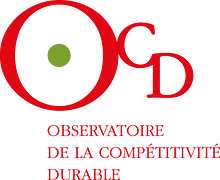
The Agence française de développement (AFD), the Foundation for Studies and Research on International Development (FERDI) and AfricaFrance have organized a conference on the Africa’s competitiveness : How to reinforce the sustainable competitiveness in Africa?
September 26, 2017, 05:30 – 07:30 pm Address : salle Mistral-AFD (Paris)
After two decades of significant progress punctuated by rising per capita incomes and poverty reduction, Africa is now facing a marked slowdown in economic growth. Whereas during the last decade the average growth rate was 6%, the end of the "super cycle" of the raw materials is the main cause of a brutal slowdown with only 3.5% growth in 2015 and barely 1.5% for 2016 according to recent IMF statistics.
The evolution of the situation in South Africa is a testimony of the magnitude of the shocks. Under the combined effects of drought, falling commodity prices and institutional problems, the country entered a recession by signing a second quarterly contraction of its GDP. Returning to sustainable growth will require intensifying efforts and amplifying reforms in many fields, in particular those related to the diversification of productive systems and exports, still too dependent on raw materials.
The objective assigned to the seminar is twofold:
The event will be moderated by Sabine Cessou, journalist
Discussion panel:
https://competitivite.ferdi.fr/
On 26 September 2017, FERDI launched the Sustainable Competitiveness Observatory (SCO) in the Agence Française de Développement [French Development Agency, AFD] Mistral building in the presence of around 60 academics, development practitioners and entrepreneurs. The launch event, entitled ‘Building sustainable competitiveness in Africa’, was moderated by Radio France Internationale journalist Sabine Cessou. The speakers were Jean-Michel Debrat (AfricaFrance), Marie-Hélène Loison (AFD), Patrick Plane (Centre National de la Recherche Scientifique [French National Centre for Scientific Research, CNRS] Research Director and Head of the SCO Programme at FERDI), Ludovic Morinière (BearingPoint) and Christophe Angely (FERDI).
Following an opening address by Vincent Caupin (AFD) and Patrick Guillaumont, Patrick Plane introduced the SCO – a statistical tool created by FERDI, with support from AFD and AfricaFrance. Whereas existing databases tend to place too much emphasis on market share and economic appeal, the SCO instead focuses on sustainable competitiveness, combining three aspects: economic appeal, competitive pricing and vulnerability.
Why sustainable competitiveness? Africa’s 54 countries are marred by uncertainty. The SCO aims to reduce this uncertainty and foster greater business sustainability by measuring vulnerability.
Where do the data come from? The data are collected from large international organisations, as well as FERDI’s proprietary indicators. Since figures always have to be treated with caution, partially subjective indicators (chiefly opinion survey findings) are deliberately omitted from the SCO. Moreover, data are routinely reprocessed and cross-referenced with the local environment. In other words, the SCO is more than just another database. It will be updated on a regular basis, with the aim of producing annual highlight reports. In summary, the SCO seeks to address a lack of reliable investor information, thereby helping private firms, multilateral organisations and the public sector decide where to invest in Africa.
What can we learn from the SCO? Countries across the Sahel are especially vulnerable. Coastal countries have the greatest economic appeal, although they still fall well short of Indian or Chinese standards. The most competitive prices are to be found in the far north and south of the continent. An analysis of input costs reveals a high premium on information and communication technologies (ICTs), low wages and electricity prices in line with India and China. Yet access to electricity is still the biggest obstacle. In order to achieve sustainable competitiveness, Africa needs to invest in human capital, reduce vulnerabilities (especially the security situation in the Sahel), produce more tradable goods across all three sectors, and slash the cost of intermediate inputs (such as electricity, ICTs, and transport and logistics).
During the subsequent panel discussion, moderated by Sabine Cessou, the speakers touched on a range of issues including the CFA franc, how the growing service industry is fuelling sooner-than-expected deindustrialisation of Africa’s economies, the economic performance gap between the continent’s French-speaking and English-speaking countries, youth employment and workforce training. Marie-Hélène Loison explained how donor investment in vocational training and corporate governance can affect certain competitiveness variables. Jean-Michel Debrat and Ludovic Morinière claimed that there is no evidence to suggest a performance gap between French-speaking and English-speaking countries. They called for an end to such comparisons, arguing that whilst attitudes to business differ from one country to the next, results vary over time and the language has little to do with growth and development. Instead, they said we should deal with this matter country by country, focusing on questions such as energy and infrastructure. They also pointed to the fact that the SCO does not directly address the issue of the CFA franc. Christophe Angely, however, recalled that the single currency has long been a subject of debate, albeit one that comes in waves. He pointed to the political nature of current debates and stressed that there is no evidence that devaluation would boost competitiveness across the currency bloc.
In his closing address, Jean-Michel Debrat explained how the SCO addresses a genuine need, produces meaningful statistics, enables scrutiny and, ultimately, provides greater certainty for firms looking to invest in Africa.